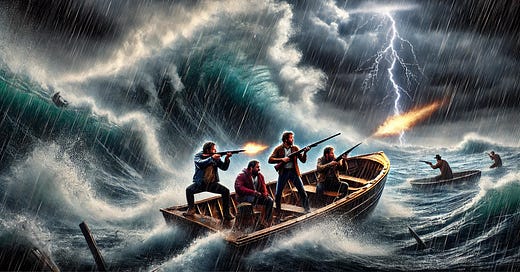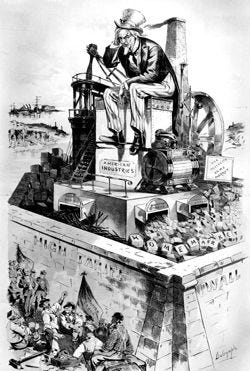Shooting Holes in the Boat
Tariff wars have a sordid history of sinking economies and roiling global markets.
In 1982, America was in the throes of the worst economic downturn in the United States since the Great Depression. Unemployment was high, consumer spending low, and widespread economic hardship was gripping the nation. That’s when President Ronald Reagan delivered an address to the nation denouncing tariffs.
“We're in the same boat with our trading partners. If one partner shoots a hole in the boat, does it make sense for the other one to shoot another hole in the boat? Some say yes and call that getting tough. Well, I call it stupid. We shouldn't be shooting holes; we should be working together to plug them up. We must strengthen the boat of free markets and fair trade so it can lead the world to economic recovery and greater political stability.” -Ronald Reagan
Economists have long warned that aggressive, protectionist tariffs lead to higher prices for consumers, reduce competition, create inefficiencies in the economy, and harm domestic industries that rely on imported goods, ultimately resulting in job losses, economic downturns, recessions, and depressions.
The Tariff of 1828, signed into law by President John Quincy Adams, was designed to stimulate industrial development and reduce American dependence on British imports. Southerners, farmers, and residents of the Western frontier dubbed it the “Tariff of Abominations” because it raised prices on imports and hurt the overseas market for US agricultural products.
The Fordney-McCumber Tariff of 1922, signed by President Warren Harding, gave the U.S. one of the highest tariff rates in the world, angering trading partners in Europe and Latin America, who struck back by boosting their own tariff rates, leading to a steep decline in world trade and contributing to the Great Depression.
The Smoot-Hawley Tariff Act of 1930, signed by President Herbert Hoover, increased duties on over 20,000 imported goods to protect U.S. farming and other industries from foreign competition during the Great Depression. Canada and Europe responded by issuing retaliatory tariffs, which reduced U.S. exports and imports by some 67 percent. This worsened the depression and helped the Nazis and other fascist parties rise to power.
Shortly before the presidential election last year, candidate Donald Trump said, “The most beautiful word in the dictionary is a tariff. It’s my favorite word.”
The stock market nosedived yesterday in response to Trump’s new “Liberation Day Tariffs.”
As I publish this, the market has just closed after plunging for a second straight day, China has announced massive retaliatory tariffs against the U.S., and the president is hosting a $1 million-per-person candlelight dinner at Mar-a-Lago tonight.
“Perspectives” is a reader-supported publication. To receive new posts and support my daily work, please consider becoming a free or paid subscriber.
I look forward to hearing your thoughts in the comments section.
Resources:
Tariffs and the American Civil War
Massacre of the American Dream
Everyday Life During the Great Depression -Lumen
Henry Ford and Hitler -History.com
Controlling The “Group Mind" For Profit And Power Without Them Ever Realizing It.
America Wages “Shock and Awe” Against America
Elon Musk-ovites, Christo-Fascism & the Specter of End Times







